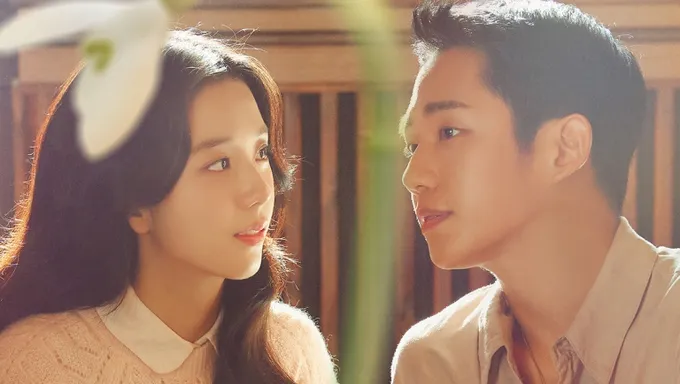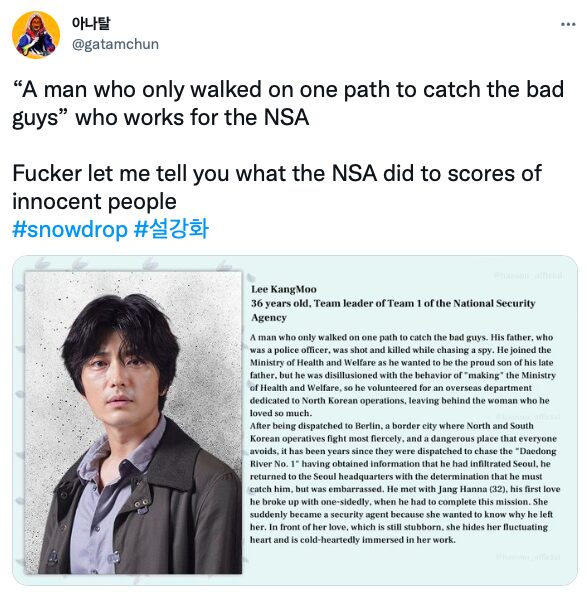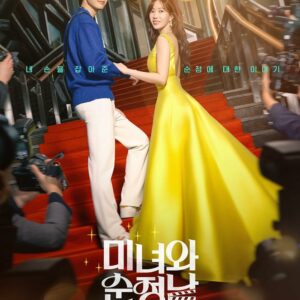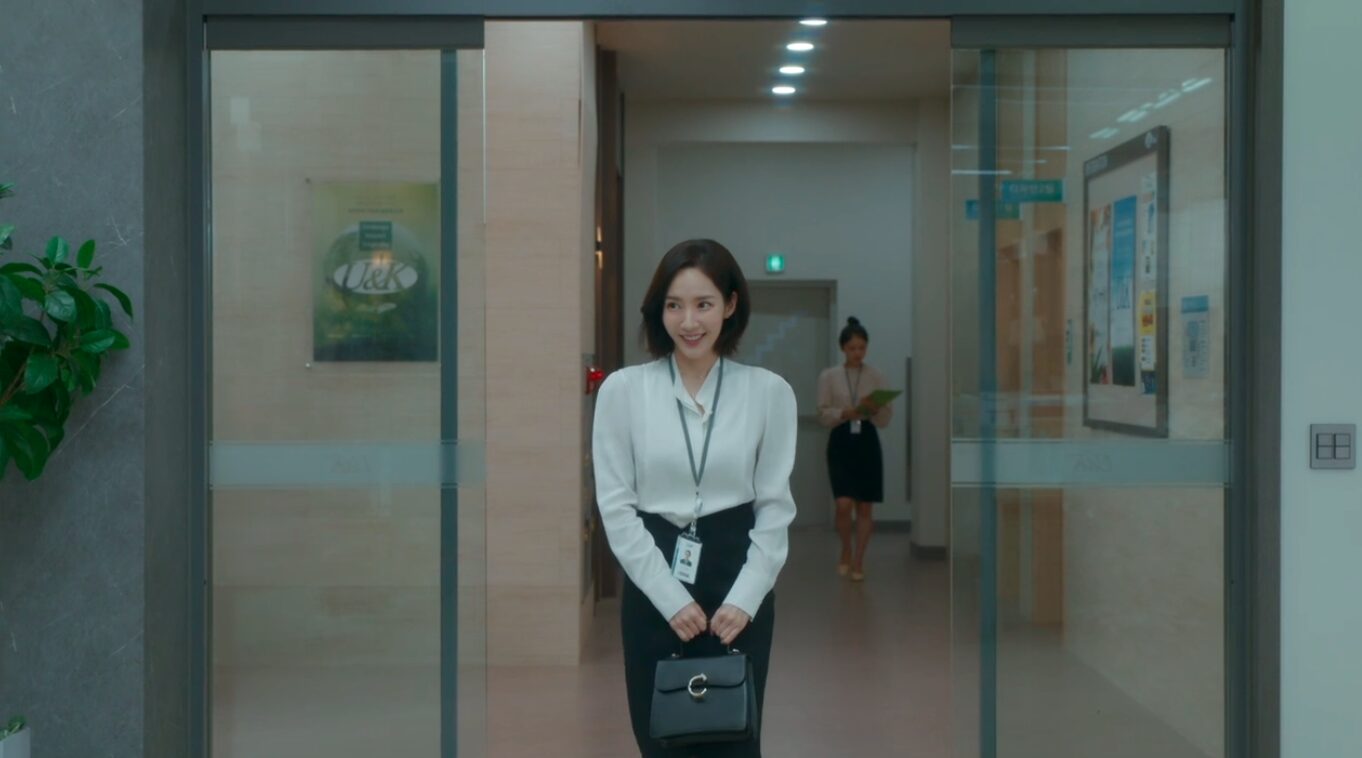
Embarrassingly, but predictably, I approached the upcoming (now airing) Snowdrop as I do most dramas. Who’s the writer, the director, the actors? What network is it on? Does the plotline interest me?
In many of these aspects, the drama on paper ticked a lot of boxes. After an impressive turn in D.P, Jung Hae-in was cast as the male lead in Snowdrop and its writer and director both worked on the extraordinary Sky Castle. The only whiff of negativity that filtered through was in its casting of the inexperienced Jisoo from the girl group, Blackpink (on this latter point, no correspondence will be entered into).
For me – and for a lot of international drama viewers – this is the extent of our assessment of an upcoming drama. Blackpink fans were obviously deeply invested but, other than that, internationally Snowdrop was just a drop in the drama bucket that was 2021. With that writer and director, you’d think that I’d be eagerly awaiting the premiere of the drama, especially since Disney+ announced that Snowdrop would be available to Australian audiences on its local streaming service.
I can watch it. But should I? That is the question.
To be clear, this post is not one in which I question the right of a drama to exist. I’m not having a philosophical debate with free speech purists (although I retain the belief that a right to free speech does not include the right to a platform and the right to free speech does not include the right to be given money by commercial sponsors).
This is more a question of whether watching a drama like Snowdrop gives legitimacy to it in the international arena; one that the networks involved could use to ignore the domestic controversy. And there is most definitely domestic controversy. Because Snowdrop is not just an historical drama: it’s been accused of revisionist history and in a way that is particularly hurtful for survivors of the period. And there are survivors – people only slightly older than I am. Ones who are not happy with Snowdrop for reasons that I think deserve amplification outside of the country.
Snowdrop is set in a University in 1987 in the lead-up to Korea’s first democratic election in December of that year. It is set specifically in the time known as the June Struggle; a popular democratic uprising of university students that followed the torture and murder of student, Park Jong-cheol. The movement grew after the terrible 1980 Gwangju Massacre: Korea’s Tiananmen Square (referenced most recently in the comparatively uncontroversial drama, Youth of May).
Students like Park Jong-cheol were detained, accused of being communists or North Korean spies, tortured and even killed. And it’s these elements of the regime’s response to student protest activity that underpins the problems domestic viewers have with Snowdrop: the accusation that communist spies were in reality infiltrating student democratic movements. An excuse used to justify a violent response to the supposed threat against what were purely domestic protestors.


Were North Korean spies and communists infiltrating student protest movements in South Korea during the 1980s? The answer is likely to be ‘no’, not at all.
And yet this is the premise of Snowdrop. A romance between a university student and a communist spy who has infiltrated the student protest movement in 1987. As far as hot spies go, Jung Hae-in fits the mould. And while the jury is still out as to whether Jisoo can act, the romance on paper has all the Romeo and Juliet, love-across-the-divide tragedy we could ask for. Jisoo’s father works for the 1980s version of the National Intelligence Service (NIS) so Hae-in’s character is exactly the kind of operative he’s charged with hunting down.
But it’s in these elements – the fatherly NIS agent, the existence of communist infiltrators – that the accusations of revisionism lie.

To find an analogy that an international audience could understand, this is the equivalent of making a romance between a Salem man and a woman who really is a witch when his father is a witchfinder. Viewed this way, Snowdrop could be remade as a romance between Joseph McCarthy’s daughter and a communist spy during McCarthyism, ignoring that this in some ways justifies McCarthyism by implying the threat he was attempting to counter was real.
There are no witches. That is the dreadful punchline of a witchhunt generally. Witches are an invention of an elite who need an enemy to justify their oppression.
It could be argued that only by watching Snowdrop can we get the details we need to critique it. And it’s for this reason that the show’s early critics did indeed tune in for its first episode. Despite the director’s assurances that they’d made changes following early criticism, commentary around its premiere episode shows that the issues people had with the show remain even upon viewing.

Ultimately, the question is whether the entire premise of the show unintentionally (or even intentionally), reinforces the claims of the military regime that ruled South Korea at the time. Regardless of how the drama unfolds, the implication is that there really were North Korean spies in student protest groups and that therefore any detention or mistreatment of the innocent were collateral damage in a necessary campaign to stop the communist destabilisation of the country.
And so, upon reflection, I will not be watching Snowdrop and I support an international boycott of the show generally. If Joseon Exorcist can be cancelled due to historical inaccuracy, then Snowdrop‘s far more personal and damaging revisionism can be as well. Claiming that it is fiction is not enough when the show’s events are clearly grounded in history.
Most importantly, to me, is the fact that domestic audiences who were directly or indirectly touched by these atrocities are this upset. And so in this I choose to be guided by them. I will not be watching Snowdrop.
And if you want to read the entire (continuing) thread that inspired this post, then it can be found on Twitter here.





LT, thank you pulling this information together and sharing your thoughts!
A thoughtful post, Lee. Such issues are never easy, nor are they simple. I may, or may not, take a peek at “Snowdrop.” I have been mulling over it for a fortnight or so. I am reading a scottish novel at the moment set at the time of James 1 (VI) and features his notorious witchfinder general. I found it interesting as I did say to myself, was this person as notorius as written in the book? Then I did some research around the statistics and I was blown away by the numbers of victims and shear ruthlessness. In today’s terms – Starlinesque.
Good stuff, and the character intro at the end is particularly galling. Anyway, apparently it wasn’t North Korean spies but NIS agents that were infiltrating those student groups in droves, as shown in the flashbacks in the Kim Hyun-joo / Ji Jin-hee drama Undercover. Oddly, Heo Joon-ho, Jisoo’s dad in Snowdrop, played a far more realistic kind of NIS guy in Undercover. The character of Im Hyung-rak is one of Undercover’s highlights: a doting grandad and urbane civil servant, but also a true fascist whose ideology and methods are able to survive any democracy.
Thank you for this! I’ve been thinking a lot about these historical revisionism controversies, but only with the most basic – misguided – knowledge of what was happening. I thought this was a “you’re changing our proud history” kind of situation (because that’s what I assumed the controversies around Joseon Exorcist and Mr Queen to be), when here it seems like it’s the opposite, a “you’re hiding our shameful history” situation instead.
Also, I recommend everyone watch 1987: When The Day Comes for a film about the murder of Park Jong-cheol and aftermath, it was stunning and very faithful to the real history.
Watch it or not is everyone’s personal decision (let me just tell, the right is not the only side using this drama in their political games). But I’d like to clear one of the lies being spread: male lead is a spy, but he has NEVER infiltrated the democracy movement, nor took part in any protest, let alone lead it. He is disguised as an ordinary student, but not an activist. Nor will he ever take part in the movement, as per jtbc’s statement – and they would not be foolish enough to blatantly lie on record, when the issue is already as big as this.
Rather than what the famous internet thread is claiming, Snowdrop actually shows the leaders of the regime cooperating with North Korea.
Thank you for this summary. I like Jung HaeIn but we reluctant to even consider the drama because of JiSoo (nothing against her, just didn’t want another idol heroine). Heard about the controversy but didn’t know the details. Your summary provides a nuanced look. A lot of commentators wondered why a newbie idol was cast in such a meaty role. I’m now wondering if casting JiSoo was to capitalize on her fan base to cover up the revisionist take of the drama. Disappointed that Jung HaeIn is attached to the project but everyone’s got to make a living.